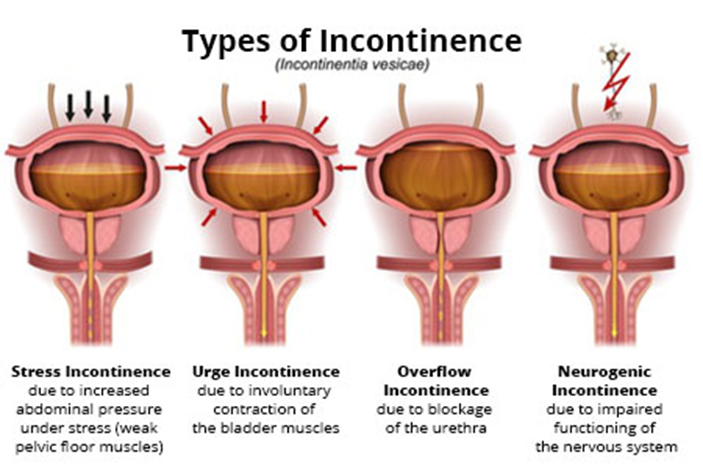A nurse is caring for a client who tells the nurse she experiences urinary incontinence when she sneezes. The nurse recognizes this is an expected finding for which of the following types of incontinence?
Stress incontinence
Urge incontinence
Overflow incontinence
Reflex incontinence
The Correct Answer is A
A. Stress incontinence
Stress incontinence is the involuntary loss of urine during activities that increase intra-abdominal pressure, such as sneezing, coughing, laughing, or lifting heavy objects. In stress incontinence, the pelvic floor muscles are weakened, leading to inadequate support of the bladder and urethra. This results in leakage of urine during moments of increased pressure on the bladder.
B. Urge incontinence
Urge incontinence involves a strong and sudden urge to urinate, leading to involuntary urine loss. It is often associated with an overactive bladder and may not be related to increased abdominal pressure.
C. Overflow incontinence
Overflow incontinence occurs when the bladder is unable to empty completely, leading to constant dribbling of urine. It is often associated with conditions that obstruct urine flow, such as an enlarged prostate in men.
D. Reflex incontinence
Reflex incontinence is characterized by the involuntary loss of urine due to a reflex arc that bypasses normal control mechanisms. It is often associated with neurological conditions that affect bladder control.

Nursing Test Bank
Naxlex Comprehensive Predictor Exams
Related Questions
Correct Answer is C
Explanation
A. Xerostomia
Xerostomia is dry mouth, a condition where the salivary glands do not produce enough saliva. It can have various causes, including medications, medical conditions, or dehydration. Xerostomia is not directly related to teeth grinding.
B. Halitosis
Halitosis is bad breath. While dental issues, including bruxism (teeth grinding), can contribute to bad breath, halitosis itself does not specifically describe teeth grinding.
C. Bruxism
Bruxism is the medical term for teeth grinding or clenching, especially during sleep. If a client suspects or reports grinding their teeth at night, it is appropriate to document and discuss the issue as bruxism. Bruxism can lead to dental problems, jaw pain, and headaches.
D. Sordes
Sordes refers to a collection of foul matter, such as debris or crusted material, around the mouth. It is not related to teeth grinding.
Correct Answer is A
Explanation
A. "Eating yogurt can help decrease gas odor that I have."
This is the correct choice. Yogurt contains probiotics, which can contribute to a healthy balance of bacteria in the digestive system, potentially reducing gas odor associated with a colostomy.
B. "I should eliminate pasta from my diet so that I don’t have as many loose stools."
This statement is incorrect. Pasta, as a general rule, is not associated with causing loose stools. Dietary adjustments should be individualized, and specific triggers for loose stools vary among individuals.
C. "My largest meal of the day should be in the evening."
While meal timing can vary based on personal preferences and lifestyle, there is no strict rule that the largest meal must be in the evening. It depends on individual habits and dietary needs.
D. "Carbonated beverages can help control odor."
This statement is incorrect. Carbonated beverages are not typically associated with controlling odor related to a colostomy. In fact, they may contribute to increased gas production, potentially exacerbating odor issues.
Whether you are a student looking to ace your exams or a practicing nurse seeking to enhance your expertise , our nursing education contents will empower you with the confidence and competence to make a difference in the lives of patients and become a respected leader in the healthcare field.
Visit Naxlex, invest in your future and unlock endless possibilities with our unparalleled nursing education contents today
Report Wrong Answer on the Current Question
Do you disagree with the answer? If yes, what is your expected answer? Explain.
Kindly be descriptive with the issue you are facing.
